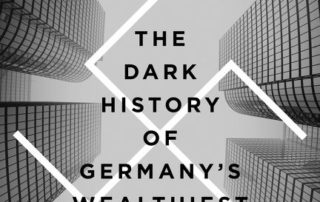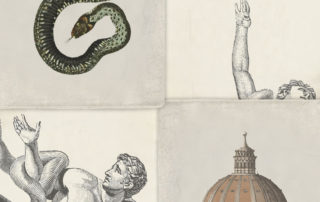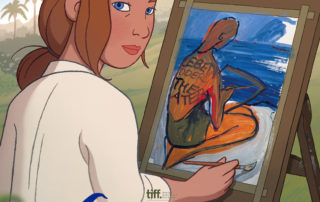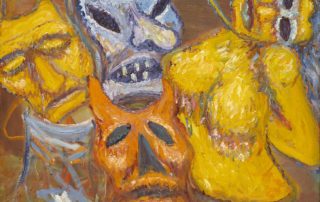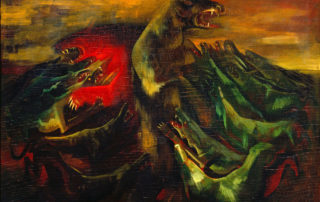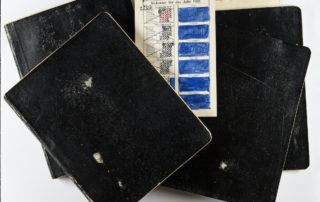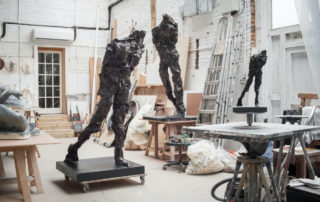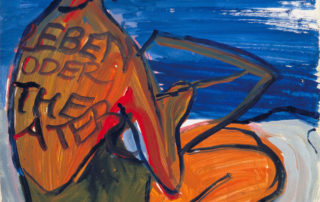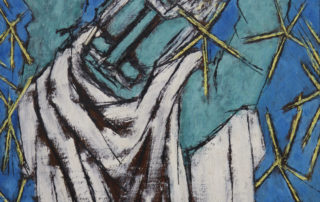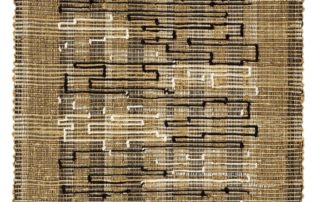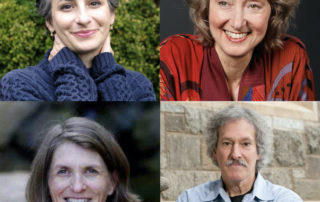Rachel Stern2022-07-20T13:29:12-04:00June 9th, 2022|Events, Lectures, Past Events|
This event features a conversation between Rachel Stern and David de Jong, author of the landmark work of investigative journalism, which reveals the true story of how Germany’s wealthiest business dynasties amassed untold money and power by abetting the atrocities of the Third Reich – and how America knowingly allowed these horrors to happen. In 1946, Günther Quandt – patriarch of Germany’s most iconic industrial empire, a dynasty that today controls BMW – was arrested for suspected Nazi collaboration. Quandt claimed that he had been forced to join the party by his archrival, propaganda minister Joseph Goebbels, and the courts acquitted him. But Quandt lied. And his heirs, and those of other Nazi billionaires, have [...]
Rachel Stern2022-08-25T13:01:20-04:00June 7th, 2022|Events, Lectures, Past Events|
Ludwig Pollak (Prague 1868-1943 Auschwitz) was an extraordinary connoisseur of antiquities--an Austro-Hungarian Jew whose path into academia was impeded by his religion, but who settled in Rome, where he carved out a unique place for himself as an expert in recognizing, understanding, and organizing great works of art. It was he who shaped and articulated the magnificent collections of JP Morgan. Of perhaps even greater consequence, his astute eye saw a sculpted fragment of an arm in a flea market that, he deduced, was the limb missing from the spectacular Hellenistic-Roman sculptural group known as Laocoon. He gifted that arm fragment to the Vatican so that it might complete the work that occupied an important place within [...]
Rachel Stern2022-06-22T15:01:42-04:00June 1st, 2022|Events, Lectures, Past Events|
Join us as the film's producer, Julia Rosenberg, speaks with Ori Z Soltes from Georgetown University in Washington DC about her motivation, thoughts and decisions that went into the creation of her newly released animated film "Charlotte." Moderated by Rachel Stern, Executive Director of the Fritz Ascher Society. Image above: Film poster "Charlotte" "Charlotte" is an animated drama that tells the true story of Charlotte Salomon (1917-1943), a young German-Jewish painter who comes of age in Berlin on the eve of the Second World War. Fiercely imaginative and deeply gifted, she dreams of becoming an artist. Her first love applauds her talent, which emboldens her resolve. But [...]
Rachel Stern2022-08-03T14:52:23-04:00May 19th, 2022|Events, Lectures, Past Events|
When Ludwig and Else Meidner met in 1925, he was already an established artist well-known for his so-called Apocalyptic Landscapes. Although Else started as Ludwig’s student, she developed a distinct independent style and he always praised her art as more refined than his own “coarse” works. As Else Meidner slowly gained recognition in Berlin art circles, her career was abruptly cut short by the Nazi-regime in 1933. She moved to Cologne with her husband in 1935; and they emigrated to England in 1939 only a few weeks before the war started. In London both lived largely unnoticed by the English art scene. But while Ludwig frustratedly returned to Germany, she decided to stay in England. Their complicated relationship developed from [...]
Rachel Stern2022-05-19T05:21:58-04:00April 25th, 2022|Events, Lectures, Past Events|
Between 1933 and 1945, the National Socialist regime controlled artistic work in Germany. Particularly artists who were persecuted based on their religion, race, or political views fled into exile due to threats from the government. But what happened to the artists who remained in the country? Isolation, lack of an audience, and limited exchange impacted the creativity of the individuals who were deprived of a basis for work and life under National Socialism. Their situation is often described in a generalized way as “ostracism” or “inner emigration.” In light of the multilayered and divergent personal circumstances, however, these terms fall short of the mark. Image above: Hans Grundig, Clash of the Bears and Wolves, 1938, Oil on plywood, 90,5 [...]
Rachel Stern2022-05-04T15:26:49-04:00April 11th, 2022|Events, Lectures, Past Events|
On October 26, 1933, Hans Uhlmann was arrested by the Gestapo on the street. In the notorious Columbia-Haus, he was interrogated for several weeks and then found guilty by the court of appeal of “preparations for a traitorous enterprise.” He spent a year and a half in prison—first in Moabit and then in Tegel Prison. The artist recorded his experiences of those years in diaries. In parallel with these diaries, he produced four books of sketches. In his diary entries Uhlmann describes his arrest as well as scenes from daily life in confinement but above all his artistic concerns and projects: “I think often of freedom; of my first works; I occupy myself here by imagining these figures” (May [...]
Rachel Stern2022-09-07T15:52:51-04:00March 28th, 2022|Events, Lectures, Past Events|
Maurice Blik has lived in England since being liberated from Bergen Belsen concentration camp, where he was taken as a small child from his birthplace, Amsterdam. The ability to come to terms with this experience and to confront the face of humanity that he has witnessed, stayed silent in his life for some 40 years. It finally found a voice in the passionate sculptures which began to emerge in the late 1970s when he created a series of horses’ heads. These noble and benevolent creatures posses an energy and a life force that seem just barely harnessed long enough to take their shape in the clay itself. Later he progressed to more figurative work in which the irrepressible joy [...]
Rachel Stern2022-06-07T11:49:44-04:00February 13th, 2022|Events, Lectures, Past Events|
Charlotte Salomon (1917-1943), was a hugely talented Berlin-born artist who was murdered at Auschwitz, four months pregnant, at the age of twenty-six. Her main body of work, a sequence of nearly 800 gouache images entitled Leben? oder Theater? (Life? or Theatre?), and created while seeking refuge in the South of France, is an ambitious fictive autobiography which deploys both images and text, and a wide range of musical, literary and cinematic references. The narrative, informed by Salomon's experiences as a cultured, and assimilated German Jewish woman, depicts a life lived in the shadow of Nazi persecution and a family history of suicide, but also reveals moments of intense happiness and hope. Challenging the artistic conventions of Salomon’s time, it remains [...]
Rachel Stern2022-04-06T15:57:51-04:00January 21st, 2022|Events, Lectures, Past Events|
Born in the Russian Empire, Ben-Zion (Benzion Weinman, 1897-1987) immigrated to New York City between the wars, arriving as a craftsman of words whose cultural Zionist convictions led him to write his poetry in Hebrew. By the early 1930s, the rise of fascism and its particularized manipulations of language drove him to despair of the power of words and to turn to visual art as a medium of expression. Endlessly creative, across the next six decades he produced a flood of drawings and oil paintings and sculptures often made by re-visioning found objects of wood, stone, and iron. As a founding member of the expressionist group, "The Ten"--that included among others a young Mark Rothko--Ben-Zion addressed social, political, and cultural [...]
Rachel Stern2022-03-02T19:19:46-05:00December 31st, 2021|Events, Lectures, Past Events|
In the late nineteenth century, the sculptor Joseph M. Abbo (1888–1953) – who later renamed himself Jussuf Abbo – was born in Safed, in the province of Beirut of the Ottoman Empire. As a young man, he began working as a labourer on the restoration site being led by an architect, Hoffmann, on behalf of the German government. Abbo was noticed and was rapidly promoted to the drawing-office and to stone-carving. He was offered a scholarship at the Berlin School of Art. Jussuf Abbo arrived in Germany in 1911 and began studying at the Royal Academy of Fine Arts in Berlin in 1913. By 1919 he had a master studio in the Prussian Academy of Fine Arts. Throughout the [...]
Rachel Stern2022-08-26T05:17:58-04:00October 14th, 2021|Events, Lectures, Past Events|
Anni Albers (Berlin 1899 – 1994 Orange, CT) found her artistic identity at the renowned Bauhaus--but not where she expected to. The gender-restrictive conditions at the school pushed her to textile work. As the Nazis forced the Bauhaus closure, Anni and her already well-known husband, Joseph Albers, immigrated to the United States, where Joseph and later Anni were invited to teach at Black Mountain College in North Carolina. From there to New York and Yale University, while her husband gained renown as a teacher and practitioner of painting, Anni expanded her presence as an innovator in diverse textile media and styles, shaping a far-flung, influential career that resonates to this day. The United States presented Albers with new [...]
Rachel Stern2022-08-26T05:12:16-04:00October 14th, 2021|Events, Lectures, Past Events|
What is it that defines human identity? DNA? Language? Culture? Landscape? Polity? Or is it a combination of all of these factors? How do the sources of identity make it easy or difficult for individuals who migrate from one location to another—by choice or under duress—not merely to adapt but to become fully comfortable within their new home? In this brief Zoom Conference, an interdisciplinary panel of experts considers how identity is shaped by our genomic make-up; how it is affected by the migration from home to new and different dwelling places; and how, in particular, migrational shifts can affect artists and their creative process. Expert Panel: Libby Copeland, Award-winning journalist and author Ori Z Soltes, Teaching Professor at Georgetown [...]


